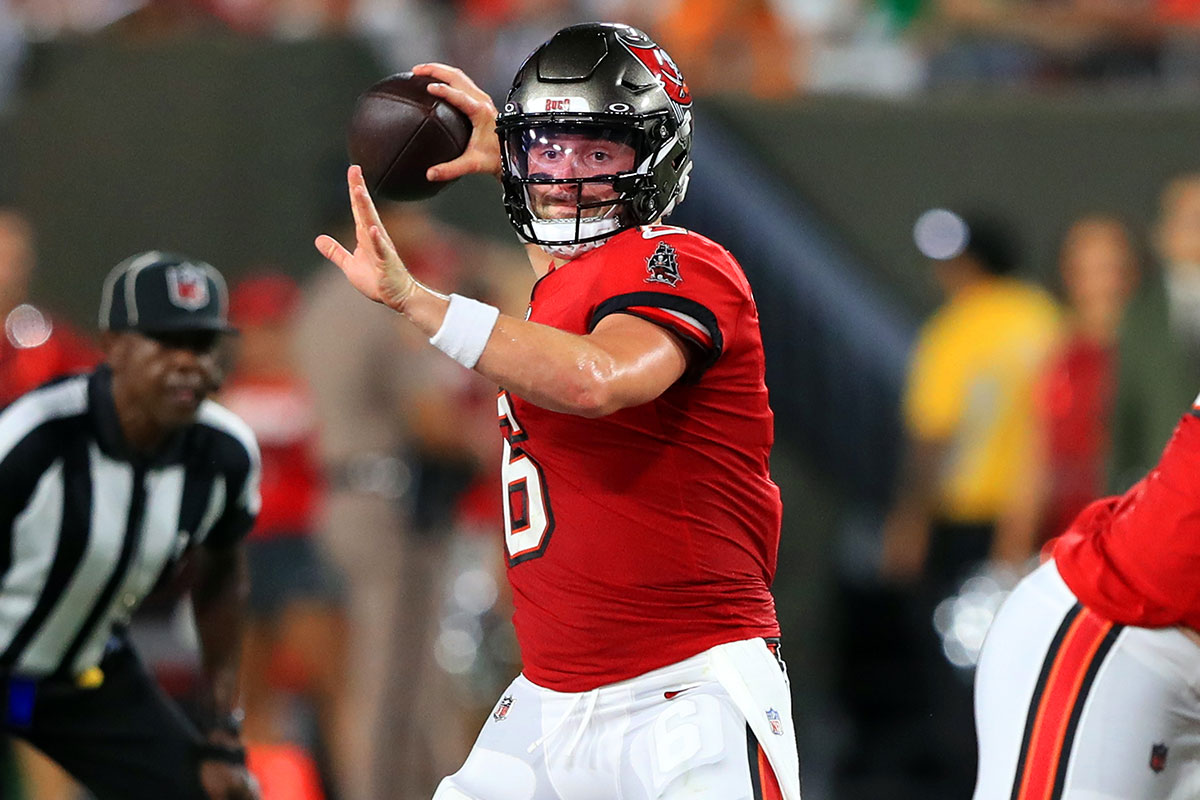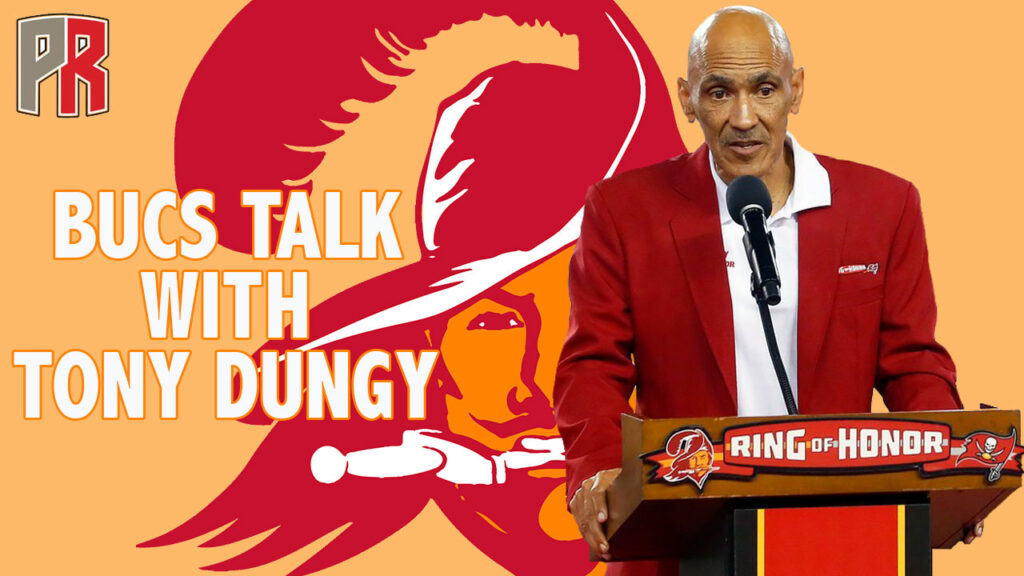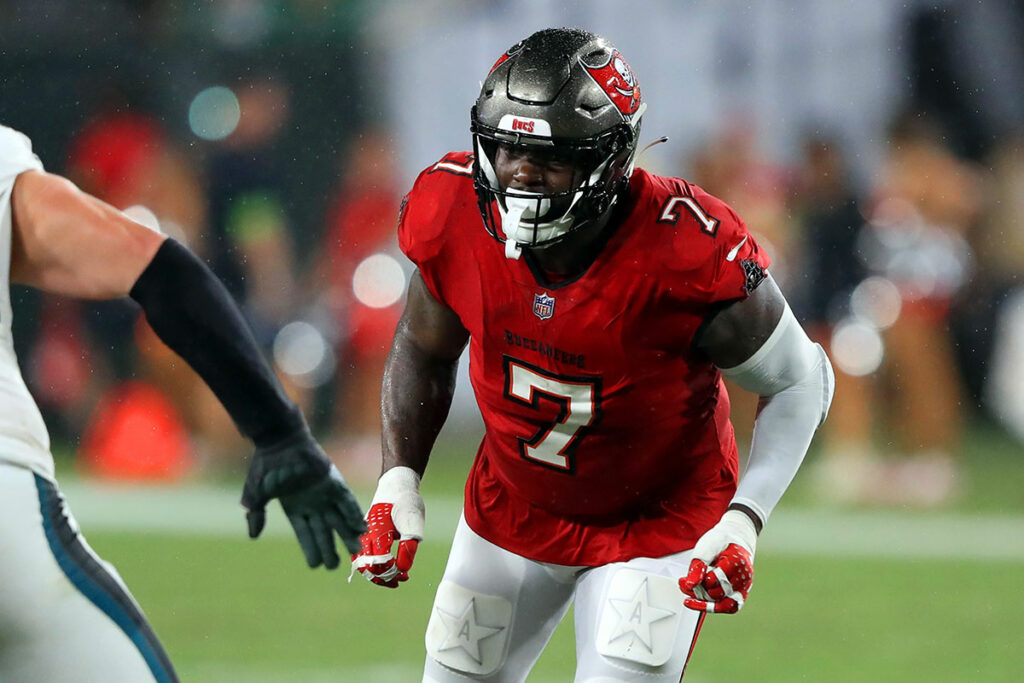Welcome to SR’s Fab 5 – my weekly insider column on the Bucs that features five things that are on my mind. SR’s Fab 5 is now a quicker read, but still packs a punch.
This week’s SR’s Fab 5 column is focused on the Bucs’ VERY big game against the Lions this Sunday. Enjoy!
FAB 1. Is A Bucs vs. Lions Shootout Brewing?
Fresh off scoring a season-high 42 points in a big win over Carolina, the Detroit Lions boast the league’s fourth-highest scoring offense, averaging 29.6 points per game. Meanwhile, the Bucs have yet to even score 29 points in any game this year.
Yet the Tampa Bay offense came close in New Orleans, scoring a season-high 26 points. The Bucs scored 27 points in a win over the Bears in Week 2, but seven of those points came on Shaq Barrett’s pick-six, as the offense was only responsible for 20 points.
As good as Todd Bowles’ defense is and has been over the years, the Bucs have some experience being involved in shootouts over the last few seasons.
In 2021, the Bucs beat the Cowboys, 31-29, in the season opener, but lost, 34-24, in Week 3 at Los Angeles. After a 36-27 loss at New Orleans, the Bucs rebounded with a 38-31 win at Indianapolis, and beat the Bills, 33-27, in overtime, in addition to coming back and stunning the Jets, 28-24 – despite not having Antonio Brown for the rest of the second half after he quit on the team.
Last year, even as Tampa Bay’s scoring plummeted from averaging 30 points per game as it did from 2020-21 to just 18 points per game, there were a few high-scoring games.
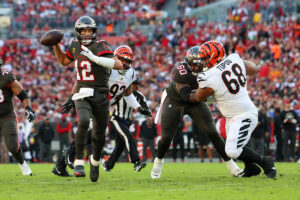
Bucs QB Tom Brady – Photo by: USA Today
Unfortunately, the Bucs were on the losing end of a couple of those games. Tampa Bay fell to Kansas City in Week 4, 41-31, and later in the year, 34-23, against Cincinnati – despite an early 17-0 lead. Yet the Bucs did rally from a halftime deficit to beat the Panthers, 30-24, on New Year’s Day to win the NFC South title.
Long gone are the days when scoring 30 points or more was routine in Tampa Bay when Tom Brady was at the helm. The Bucs scored 30 points or more in seven straight games, including the postseason, to win Super Bowl LV.
Tampa Bay has a new offensive scheme with a new play-caller, a new quarterback and a revamped offensive line this year. The Bucs offense is still in its infancy, evidenced by the fact that it’s averaging just 21 points per game through the first four weeks of the season. Better than last year’s paltry 18 points per game, but not where offensive coordinator Dave Canales wants to be.
“If we just execute our current plays better we’d be in the high 20s-30s like the Lions,” Canales told me. “We’re just not there yet.”
In doing his film study on the Lions this week, Canales is paying close attention to Seattle’s 37-31 overtime win at Detroit. When Canales was hired, he brought the Seahawks playbook with him and put his own spin on it with Tampa Bay’s personnel. So the similarity he sees on film from the last two Seattle wins over Detroit is quite helpful in detecting some of the possible weaknesses of Detroit’s defensive scheme.
“Oh yeah,” Canales said. “We played them last year in Detroit, too. So two games right there, very valuable stuff. Even on a micro level, just the techniques of how they play, the different shades they play on the defensive front, some of the secondary players and how they stack up against similar bodies. D.K. [Metcalf] and Mike [Evans] are bigger guys. Chris [Godwin] is a bigger guy. So they can kind of see some of those things.”
The Seahawks amassed 393 yards of total offense, picked up 28 first downs and scored 37 points in the road win in Week 2 without both of their starting offensive tackles.
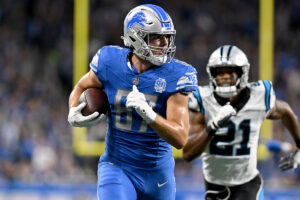
Lions TE Sam LaPorta – Photo by: USA Today
Canales is also reviewing the film of Seattle’s 48-45 victory at Detroit from 2022. He was on the Seahawks’ staff at the time, so he has familiarity with Aaron Glenn’s defense.
Seattle gained a whopping 555 yards, including 235 yards on the ground, while picking up 27 first downs in Detroit last year. The Seahawks’ offense was so explosive that Seattle didn’t even punt.
So could the Bucs hang with the Lions in a shootout if that were to occur on Sunday?
“It’s coming, it’s getting there,” head coach Todd Bowles said of the Bucs offense. “Every game is going to be different, whether we run it better, whether we throw it better, whether we get turnovers, whether we make stops. You want to win in different ways – it builds the character of your team. You don’t know how you’re going to win going into Sunday, you just cover everything in hopes one unit covers the other unit.
“That’s kind of where we are right now as we get going. If it gets to be a shootout, I hope we can shoot it out and win the ballgame. You want the game to go a certain way, but like you said, at the end of the day you’ve got to score one more point than the other team.”
Bucs quarterback Baker Mayfield is hopeful that the offense has evolved enough week-by-week to where Tampa Bay could get in a shootout – and win.
“I’m not going to compare us to [Detroit’s] offense, but for us as a whole, [the game against New Orleans] was a game that we had talked about scoring in the red zone and improving in that aspect,” Mayfield said. “For us, it’s continuing to do all the little things right, which is why we haven’t had the best offensive game yet.
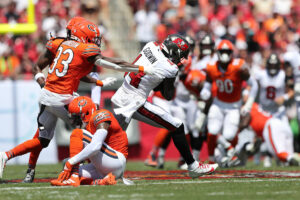
Bucs WR Chris Godwin – Photo by: Cliff Welch/PR
“So, continually improve as the year goes on and this is one of those games that we can’t look at their score, we just have to continue to do our job and put up the most points possible. They play with so much effort so we have to match that effort and then outdo it, honestly. [We have to] do our best to execute, as well.”
Bucs wide receiver Chris Godwin, who was a part of those Tampa Bay teams that routinely put up 30 points per game a few years ago, believes that Bowles’ defense could prevent a shootout from happening.
“I think I’m confident in our offensive ability to score points, but I’m also confident in our defense,” Godwin said. “They’ve been scoring at a high clip, but we’ve got a great defense as well, so that’s something that they’ve got to contend with.”
The over/under for the Bucs vs. Lions game is 44 points. This feels like a week to take the over.
Cue the shootout.
FAB 2. Whoever Wins In The Red Zone Wins The Game
In reviewing the Lions’ hot, 4-1 start, the one thing that sticks out is that Detroit just doesn’t kick field goals.
The Lions score touchdowns.
In fact, out of the 23 offensive scores this year from Detroit, the Lions have scored 18 touchdowns and kicked just five field goals. Twelve of Detroit’s 18 offensive TDs have come inside the red zone.
Conversely, the Bucs have only scored eight offensive touchdowns this season and have kicked seven field goals. Six of those touchdowns have come inside the red zone, where Tampa Bay has struggled and too often has settled for field goals.
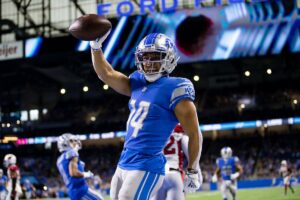
Lions WR Amon-Ra St. Brown – Photo by: USA Today
Detroit’s red zone offense is ranked seventh in the league, tied with Kansas City at 63.16%. Tampa Bay’s offense is ranked tied for 20th in the league, evened up with Minnesota and Las Vegas at 50%. That’s a decided advantage for the Lions.
But the Bucs’ red zone defense is the second-best in the league, allowing touchdowns just 27.27% of the time. The Lions’ red zone defense is more porous, allowing a TD rate of 64.71%. Tampa Bay has a big edge in this statistical category.
On Sunday, something’s got to give.
Simply put, whichever team has the best success scoring touchdowns in the red zone and holding the opponent to field goals will win the game. The Bucs offense needs to score touchdowns and the defense needs to hold the Lions to field goals.
That, and winning the turnover battle, is the clear – and perhaps only – path to victory. Look no further than Tampa Bay’s Week 4 win at New Orleans where Baker Mayfield threw three red zone touchdown passes inside the 5-yard line and the defense held the Saints to just three field goals. The Bucs also won the turnover battle against the Saints, 3-1.
On Monday, Bucs co-defensive coordinator Larry Foote gave one of the team’s defensive assistants some of the credit for the red zone success.
“It’s [assistant secondary coach] Tim Atkins – he does our red zone breakdowns,” Foote said. “He’s the reason. It starts up top, [Todd] Bowles put a lot of emphasis on red zone. You win or lose off of that. If you hold them to three points and save four points on the scoreboard, at the end of the day, late in the fourth quarter, you’re going to be in games because of that.
“Each time you’re down there, it’s the difference [between] winning and losing. Those guys are buying in and communicating, because they go fast. Up front [is] doing a good job because you’ve got to play a little coverage down there sometimes. So far, we’re rock solid.”
Bowles said the key to winning on defense backed up inside a team’s own 20-yard line is winning on first down.
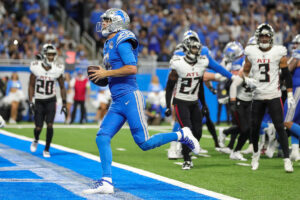
Lions QB Jared Goff – Photo by: USA Today
“The biggest thing is getting them in second-and-long,” Bowles said. “If you win first down, you have a chance, knowing it’s going to be a pass most of the time. We play more third-and-longs in that category, so right now, we do a good job of keeping people from just working all three downs.
“They get two to work with and then they get one to work with – it makes it a little easier to call from that standpoint. Sometimes it works just not letting them down there. We’ve just got to continue that and be smart when they do.”
Because of a truncated space for the offense to work with and a limited area for the defense to defend, the defense can have an advantage if the players hang tough and play smart, assignment-sound football.
“Keys and guys are buying in,” Foote said. “Every team plays pretty much the same stuff down there – it’s just a matter of our guys are executing. They’re talking at a high level.
“Bowles is putting them in good defenses, but at the end of the day, those guys are making plays. When you get down there, you’ve only got a small window in there and you’ve got to make plays. Those guys are doing a good job.”
FAB 3. How The Bucs Can Set Up Their Run Game – With The Pass
If Tampa Bay offensive coordinator Dave Canales learned something from playing the best run defense in the league in a 25-11 Week 3 loss against Philadelphia, it’s to not try to run the ball against a brick wall.
The Bucs faced a Saints defense that is typically good at stopping the run but didn’t try to force the run early. Instead, Canales directed the passing game to come out firing. The first play was an 18-yard strike to Mike Evans.
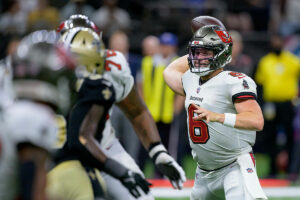
Bucs QB Baker Mayfield – Photo by: USA Today
That play got Evans involved early against Marshon Lattimore and started to get quarterback Baker Mayfield going as well. The next play was a 4-yard run by Rachaad White, followed by a 5-yard pass to Chris Godwin. A false start turned a third-and-1 into a third-and-6, but a Mayfield scramble picked up the necessary yardage to get the first down.
What followed were three more pass plays. After an intentional grounding call on first down, Mayfield completed a 6-yarder to Godwin and a 10-yarder to White before the Bucs had to punt. Mayfield found an early rhythm against the Saints, hitting four of his first five passes for 39 yards en route to passing for 246 yards and three touchdowns with one interception.
Canales didn’t force the run and the Bucs wound up with 114 yards on the ground as a result, led by White’s 56 yards and Mayfield’s 31 yards on scrambles.
“I think coming out of the first three games, I just felt like maybe I wasn’t trying hard enough to just get first downs – make yards while we’re learning the core of our system, while we’re trying to learn the fundamental blocking schemes that we’ve got to get good at,” Canales said. “The reads for the [running] backs – we talk a lot about the rhythm of the backs over the last couple of weeks – but the combos up front. We have to be able to practice all of that, but while we’re getting those things, try harder to get first downs, try harder to make yards.”
One of the ways Canales manufactured a first down was on a different kind of run play – an 11-yard end around to speedy receiver Deven Thompkins.
Detroit has the league’s third-ranked run defense, but also has the NFL’s 17th-ranked pass defense. Out of the 10 touchdowns the Lions’ defense has surrendered, eight of them have been passing scores – all of them in the red zone. In fact, seven out of the eight passing TDs allowed have come within five yards of the goal line.
Using the pass to set up the run might be the way to attack Detroit’s defense – and ultimately score on them, too.
FAB 4. Stop The Lions Run Game Before It Can Get Started
The best way to stop a good running game is to stop it before it gets started. That means winning on first down and getting tackles for loss. Those are two things the Bucs failed to do in a 25-11 loss to the Eagles in Week 3, as Philadelphia gained 201 yards on the ground and mauled Tampa Bay up front.
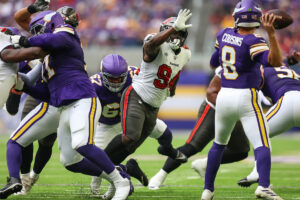
Bucs DT Calijah Kancey – Photo courtesy of the Tampa Bay Buccaneers
The Bucs have 19 tackles for loss on the season so far, averaging around five per game. But against the Eagles, the defense only had three tackles for loss – and one came on Tampa Bay’s lone sack when Jalen Hurts tripped and was touched down by linebacker Lavonte David. That one wasn’t really earned.
The Bucs rebounded with five tackles for loss at New Orleans and that played a significant role in holding the Saints’ ground game to just 70 yards. The return of Calijah Kancey, an undersized, quick, penetrating-style defensive tackle, should only help if he can work his way into the backfield against Detroit running back David Montgomery.
The newcomer has rushed for 371 yards and six touchdowns while averaging 4.2 yards per carry. Montgomery, who spent his first four seasons in Chicago, has played so well that he has kept Jahmyr Gibbs, the Lions’ first-round pick, relegated to a backup role so far with less than half the amount of carries (39) than Montgomery has (88).
“It’s not just [Montgomery] – it’s whoever touches the ball,” Bucs co-defensive coordinator Larry Foote said. “It starts up front. But I definitely mentioned that to my guys this morning – the last time [we faced] a good running team, they won it. We’ve got to win this battle. It’s going to be a big challenge because everybody knows that they’re coming in here to run the ball and that’s their identity. It’s going to be a big challenge for us.”
Jared Goff is incredibly effective with play-action passes. And while actually having a running game is not necessary to make play-action work, the more effective a team is at running the ball, the more believable and effective play-action is.
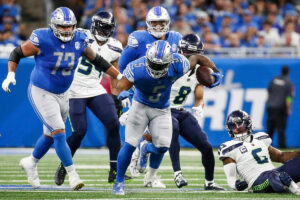
Lions RB David Montgomery – Photo by: USA Today
“I think that started last year, they put the league on notice,” Bucs co-defensive coordinator Larry Foote said. “That offense is high-powered. They can run it. They can throw it. We talked about Goff earlier – the line is good, it’s going to be a big challenge for us. Just studying those guys, they can run it and throw it. The guys have got to buy in, and you’ve got to win your one-on-one matchups. In order to beat a good offense like that, your players have got to outplay theirs. Our guys are up for the challenge.”
One of those guys that needs to win his individual matchups and continue to play at a Pro Bowl level is safety Antoine Winfield Jr., who was a one-man-gang in New Orleans with a sack, a forced fumble, a fumble recovery and a pass breakup in the end zone that prevented a Chris Olave touchdown in Tampa Bay’s 26-9 win.
“[They are a] good team,” Winfield said. “They have weapons all over – good receiving corps, good quarterback, [and] good running back. They have weapons all over, so we have to do our best to contain them as much as possible.
FAB 5. Should Zyon McCollum Start Over Jamel Dean vs. Lions?
The bye week allowed several Bucs to rest and heal, and cornerback Jamel Dean, who injured his shoulder in a Week 3 loss to the Eagles is expected to return to action. But should he return to the starting lineup?
Believe it or not, third-stringer Zyon McCollum has been the team’s best cornerback through the first three weeks of the season. He’s played the most snaps, given up the fewest catches and yards and has the most pass breakups. McCollum also has the highest Pro Football Focus grade.
But when asked if McCollum would stay in the starting lineup this week, Bucs head coach Todd Bowles said no.
“He has played well,” Bowles said. “Carlton and Dean are still ahead of him. He has a bright future and we’ve got to find ways to get him on the field, but not enough to replace the other two if that’s what you’re asking me.”
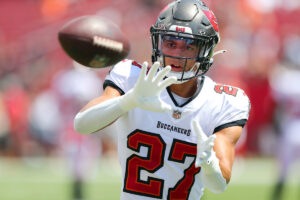
Bucs CB Zyon McCollum Photo By: Cliff Welch P/R
McCollum has started three games this season – Weeks 2 and 3 for Davis and Week 4 for Dean. He has a 73 overall grade from Pro Football Focus and a 72 coverage grade. McCollum has allowed seven catches for just 61 yards (8.7 avg.) through three games and no touchdowns. He’s broken three passes and has no interceptions.
Davis has a 68.7 PFF grade for the two games he’s played in, and he has a 68.3 coverage grade. He’s allowed 11 catches for 165 yards (15 avg.) and no touchdowns with Minnesota’s Justin Jefferson doing the most damage in Week 1. After a rough season opener, Davis bounced back last week with a 76.9 grade for the Saints game, including a 77.5 coverage grade. Davis has two pass breakups and no interceptions.
Jamel Dean has a 46.7 PFF grade in essentially two and a half games. Dean has a 43.8 coverage grade and has allowed 12 catches for 195 yards (16.3 avg.) and two touchdowns – one against the Bears and one versus the Eagles. He has no pass breakups or interceptions.
Bucs co-defensive coordinator Larry Foote chimed in with his opinion on the team’s cornerback quandary.
“You can’t ever have too many corners,” Foote said. “He’s a second-year guy. He’s improving from year one – you guys see that already in just the four games. I’m quite sure we’ve got roles for all of [those] guys. When Dean gets back healthy … let the best man win.”
Fresh off a lucrative, four-year, $52 million contract extension, there’s no doubt that Dean needs to play better. But if he falters, Bowles can’t leave him out there on the field just because he’s making an average of $13 million per season. He needs to play the best man.
And the best man so far has been McCollum.
Scott Reynolds is in his 30th year of covering the Tampa Bay Buccaneers as the vice president, publisher and senior Bucs beat writer for PewterReport.com. Author of the popular SR's Fab 5 column on Fridays, Reynolds oversees web development and forges marketing partnerships for PewterReport.com in addition to his editorial duties. A graduate of Kansas State University in 1995, Reynolds spent six years giving back to the community as the defensive coordinator/defensive line coach for his sons' Pop Warner team, the South Pasco Predators. Reynolds can be reached at: [email protected]

